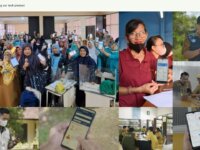Satellites collect images that can be used to identify deformations of infrastructure at millimetre level with InSAR analysis. This project investigates the use of InSAR in the monitoring of deformations of bridges. Can InSAR be of added value for a structural health assessment of bridges which, with aging assets over the largest part of Europe, becomes more and more critical? Nowadays the monitoring of bridges is very labour intensive and often not without danger. InSAR may reduce this.
Innovation Tag: Process Facilitation and Co-design
Over 3 million citizens annually visited government offices in Delhi for various transport services. To reduce interference of middleman, application pendency and physical exposure in view of ongoing Covid-19 pandemic, faceless services have been launched to offer transport services to citizens at the comfort of their home. Using AI, e-sign, biometric-based authentication and institutional restructuring, faceless services provide hassle-free contactless services to citizens.
New Zealand wants our small businesses to be the most digitally enabled in the world. Digital Boost helps owners and employees to build confidence and skills to digitally transform their businesses. Cynefin complexity theory, agile programme development, and public-private partnerships are used to deliver easily accessible learning and services. This includes bespoke playlists of video content, online diagnostic tools, peer-learning support and free or discounted digital equipment or services.…
A proof of concept has been created to incorporate design techniques in many elements of a PoD's life cycle, planning for future demands and overcoming existing hurdles. The proposed strategy prioritizes the needs of persons with disabilities and helps them acquire the resources and services they need. It also helps families gain confidence in caring for a disabled kid. This helps POD engage, lead, create, and sustain life.
GovTech Edu works with the Indonesia MoECRT to build a technology ecosystem to create an irreversible transformation for Indonesia’s education system. It includes tech platforms made available for teachers, school principals, university students & practitioners, through products like Teacher SuperApp, Education Scorecard & University Internship Matchmaking Platform. With these, the transformation to improve student learning outcomes becomes more inclusive, data driven & impact-enabling at…
The Ukraine war established a commitment to work across sectors to improve digital services to refugees. Focus on end user needs and an unbureaucratic organizational model have produced tangible results such as:
Better update of address information in national register
Electronic identification - access to digital services
Twelve agencies worked with obstacles and bottlenecks in the refugee's user journey, with the objective of good transitions between services.
Officina is a lab for innovation in the public sector whose main objective is to catalyse the energy of young talents by offering them a transformative training programme. Officina was developed to address a triple urgency: future decision makers not perceiving the public sector as an attractive workplace; the public sector having high average age workforce and lack of innovative approaches; society at large needing a more modern and appealing public sector in this key historical moment.
MedeINN arose from the need to innovate in the government sector, in a city that had been developing its innovation capabilities in all other sectors. For this reason, and under Innovative State premise, we seek to connect the Mayor's Office of Medellín´s challenges with entrepreneurs and researchers capacities. This has been achieved after a redesign of a Public Procurement for Innovation methodology, which enables Open Innovation in the government sector.
Case Study
‘Con Vos’ Network: Digitalization for Effective Governance. Community Markets to Improve Access…

When applying for state aid or other services without the means or knowledge to do it online due to the digital gap, it usually takes a day or waiting in queues and filling out paperwork. Communities have thought and offered a grassroot solution: store owners helping their peers to get online procedures done in their business, in exchange for a small fee. It is a simple innovation, yet effective when it comes to decentralize public services, foster digital inclusion, and strengthen local markets
With the Quality Tools an organisation can evaluate, monitor and compare the quality and use of its services within and between organisations. The tools include a Self-assessment, Customer Feedback and Utilisation Rate Measurement tool and are free of charge. The tools were developed primarily for public sector organisations to help them develop customer-oriented digital services and improve knowledge-based management. On a national level the tools provide data on the state of digitalisation.



